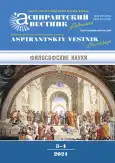Relations between a social subject and a social institution: philosophical foundations and public policy practises
- Authors: Davydov S.V.1
-
Affiliations:
- Nizhny Novgorod Institute of Management – the branch of Russia Academy of National Economics and Public Administration under the President of Russia Federation
- Issue: Vol 21, No 3-4 (2021)
- Pages: 39-42
- Section: Philosophical sciences
- URL: https://journal-vniispk.ru/2410-3764/article/view/89698
- DOI: https://doi.org/10.17816/2072-2354.2021.21.2.39-42
- ID: 89698
Cite item
Full Text
Abstract
The article deals with theoretical and applied issues of the development of relationships between social (political) subjects and social (political) institutions. In the philosophical aspect, the author notes the alternativeness of theoretical approaches to understanding the role of man in society, where the idea of “social institution” is opposed by the philosophy of the idea of subjective human activity. In this approach the work of E. Ostrom “Managing the Common. Evolution of institutions of collective activity” is analyzed and the main conclusion is that the relationship between a social (political) subject and an institution develops harmoniously and integrated is rethink. In connection with disagreement with Ostrom’s position of the author of this work in a practical aspect, an analysis of various situations is carried out, which show three types of interaction: 1) a strong social subject – a strong social institution; 2) a weak social institution – a strong social subject; 3) there is a developed social institution, but there is no a social subject. The philosophical analysis allows us to conclude that the sphere of relationships between a social subject and any institution is very heterogeneous. This is most vividly illustrated in the political sphere by the example of city public policy.
Full Text
##article.viewOnOriginalSite##About the authors
Sergey V. Davydov
Nizhny Novgorod Institute of Management – the branch of Russia Academy of National Economics and Public Administration under the President of Russia Federation
Author for correspondence.
Email: 537395@mail.ru
Postgraduate student of the Department of Philosophy, Sociology and Psychology of Management
Russian Federation, Nizhny NovgorodReferences
- Berger P, Lukman T. Social’noe konstruirovanie real’nosti. Traktat po sociologii znaniya. Moscow; 1995. (In Russ.)
- Dahin AV. The Idea of a Social and Secular State: the phenomenology of Constitution in Russia. Yuridicheskaya nauka i praktika. Vestnik Nizhegorodskoj akademii MVD Rossii. 2019;(1(45)):274–278. (In Russ.). doi: 10.24411/2078-5356-2019-10141
- Dahin AV. “Industrialization of power”: Russian political transit in socio-technological dimension. Politeks. 2019;15(4):461–482. (In Russ.). doi: 10.21638/spbu23.2019.402
- Dahin AV. “Integral city”: critical analysis of theoretical approach. Vestnik Nizhegorodskogo Instituta Upravleniya. 2019;(2(52)):18–24. (In Russ.)
- Dahin AV, Semyonov EE, Strelkov DG. Nizhegorodskaya oblast’ v situacii konflikta elit: osnovnye tendencii, prognoznye gipotezy, ocenki. In: Regional’naya politika. Moscow: Grifon; 2017. P. 235–244. (In Russ.)
- Dahin AV. State power system in Russia: phenomenological transit. Polis. Political Studies. 2006;(3):29–41. (In Russ.)
- Kutyrev VA. Poslednee celovanie. Chelovek kak tradiciya. Saint Petersburg: Aletejya; 2015. (In Russ.)
- Luman N. Obshchestvo kak social’naya Sistema. In: Obshchestvo obshchestva: v 5 kn. Kn. 1. Moscow: Logos; 2011. P. 15–201. (In Russ.)
- Makarenko EI. Subjectivity of the Russian technical intelligentsia in the implementation of computerization tasks. Vlast’. 2020;28(3):158–163. (In Russ.). doi: 10.31171/vlast.v28i3.7333
- Marchenya PP. Russian multiparty system: the cradle of civil society or the tomb of imperial statehood? Polis. Politicheskie issledovaniya. 2017;(1):41–52. (In Russ.). doi: 10.17976/jpps/2017.01.05
- Ostrom E. Upravlyaya obshchim: evolyuciya institutov kollektivnoj deyatel’nosti: per. s angl. Moscow; 2011. (In Russ.)
- Papelo VN, Kovtun BA. The development of the village chiefs institution in Russia: problems and solutions. Wschodnioeuropejskie Czasopismo Naukowe. 2016;14(2):52–55. (In Russ.)
- Hemilton M. Integral’nyj gorod. Evolyucionnye intellekty chelovecheskogo ul’ya. Moscow: Orientaliya; 2013. (In Russ.)
- Chep’yuk OR. Ekonomicheskaya bessub”ektnost’ kak faktor degumanizacii social’nyh otnoshenij. [dissertation]. N. Novgorod; 2021. (In Russ.). Available from: https://diss.unn.ru/files/2020/1070/diss-Chepyuk-1070.pdf. Accessed: 20.04.2021
Supplementary files






